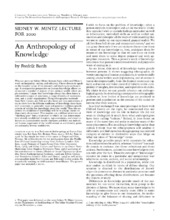An Anthropology of Knowledge
Peer reviewed, Journal article
Permanent lenke
https://hdl.handle.net/1956/4191Utgivelsesdato
2002-02Metadata
Vis full innførselSamlinger
Originalversjon
https://doi.org/10.1086/324131Sammendrag
Whereas previous Sidney Mintz lectures have celebrated Mintz’swork on inequality, racism, and ethnicity, I have chosen to speakto the broadest scope of his research and teaching in anthropology.A comparative perspective on human knowledge allows usto unravel a number of aspects of the cultural worlds which peopleconstruct. I argue that knowledge always has three faces: asubstantive corpus of assertions, a range of media of representation,and a social organization. Using ethnographic materialsfrom New Guinea and Bali and also from our own universities, Itry to show how in different traditions of knowledge these faceswill interrelate in particular ways and generate tradition-specificcriteria of validity for knowledge about the world. Thus the trajectoryof a tradition of knowledge will be to a large extent endogenouslydetermined. This implies not a diffuse relativism of“anything goes” but a relativism in which we can demonstratehow already established thoughts, representations, and social relationsto a considerable extent configure and filter our individualhuman experience of the world around us and thereby generateculturally diverse worldviews.
Beskrivelse
This paper was delivered, as the 2000 Sidney W. Mintz Lecture, to the Department of Anthropology of The Johns Hopkins University on November 2, 2000. Comments by Chi-Yue Chiu, Lars Rodseth, John Robb, Alan Rumsey, Bob Simpson and James F. Weiner.
Utgiver
University of Chicago PressOpphavsrett
The Wenner-Gren Foundation for Anthropological ResearchCopyright 2002 by The Wenner-Gren Foundation for Anthropological Research. All rights reserved. Reproduced with permission.
